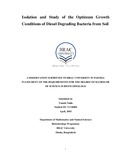Isolation and study of the optimum growth conditions of diesel degrading bacteria from soil
Abstract
The rise in industrialization and globalization has made oil spills an environmental threat all over the world. Bioremediation can be considered as an effective aid to the clean-up process of spilled oil aside from expensive and invasive physical and chemical methods. The natural degradation of oil by microorganism can help remove residual oil pollutants. Hydrocarbon compounds present in petroleum products can have deteriorating effects on both wild life and humans. Diseases, disorders and even cancer of different organ systems have been linked to the exposure to these hydrocarbons. Microorganisms have metabolic capabilities to utilize the carbon compounds and degrade them to innocuous by-products. These abilities can be targeted for bioremediation purposes. The present study screened for bacteria with capabilities of utilizing diesel as sole source of carbon for growth. Eight isolates were derived from soils of four locations, among which three seemed to have prior exposure to diesel. The bacteria were individually cultured in a mineral salt broth devoid of carbon source except for diesel for 7 days at 35ºC. The growth of bacteria was observed from visible increase of turbidity and was enumerated by CFU/ml on mineral salt agar of same composition after 7 days of culture in the broth. The genera of the eight isolates were identified as Nocardia, Corynebacterium, Bacillus, Pseudomonas and Arthrobacter by morphological characterization and biochemical test results compared to standard references. Among the eight isolates, Pseudomonas sp. exhibited relatively higher ability to grow on diesel while Bacillus sp. and Arthrobacter sp. showed relatively less growth. Nocardia sp. and Corynebacterium sp. showed no tangible evidence of utilizing diesel as carbon source. This Pseudomonas sp. isolate was further used assess the effect of different concentration of diesel and pH values on growth. The result showed that optimal growth occurred at 3% (v/v) diesel concentration especially with agitation at 120 rpm and pH variation tests showed that near neutral pH values represent better growth conditions.

